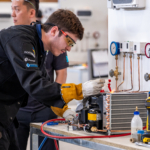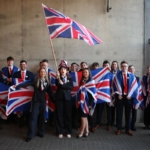Ronnie Ferris, WorldSkills UK Training Manager for Plumbing and Heating explains how he gets competitors ready for international competition and how he’s had to adapt his approach during the coronavirus pandemic.
Developing world-class plumbing and heating engineers
Plumbing and heating engineers work within the construction industry and carry out specialist work that includes installing and maintaining hot and cold water systems, heating, oil, gas, renewable energies and sanitation systems. This work is carried out in a wide range of environments from domestic dwellings to commercial and industrial premises.
It is therefore extremely important that we have the best young people coming through the apprenticeship system to carry out this important work. WorldSkills UK helps develop and ensure these young people are trained to the highest level to compete on a global stage and gain transferable skills that are brought back into the workplace.
WorldSkills UK has a proud tradition and excellent record of achievement over many years in Plumbing competitions at the international WorldSkills finals.
The route to competing on the international stage
Each year the best young plumbing apprentices across all four home nations compete in competitions with each other to see who is the best in the UK. It all begins at local level when colleges and training providers across the UK select and train their best young plumbing apprentices who may then go forward to compete at regional level. When all the regional heats have been completed, the top 10 competitors are then invited to take part in the UK finals at WorldSkills UK LIVE, held at the NEC Birmingham.
Depending on their performance and certain criteria, competitors may then be invited to become a part of Squad UK. They must be studying for a Level 2 or 3 qualification in plumbing and not older than 22 years of age in the year of the qualification.
This year, Connor Cruden from Moray College, Elgin and Samuel Henderson from Tullos Training, Aberdeen have been selected to join Squad UK and will now train together and compete with each other to see who will represent the UK at EuroSkills in Graz, Austria in January 2021 and WorldSkills Shanghai in September 2021.
Having to adopt a different approach to training
When we met up at Moray college for our initial training event in February 2020, little did we know that this would be our only face-to-face event so far. With the outbreak of COVID-19 and all colleges and training establishments having closed and travel restrictions in place, we have had to quickly adapt our training methods to ensure our competitors are ready for both competitions.
Lockdown has had a massive impact on how we deliver our training as this would in normal circumstances have been done face-to-face in a workshop environment with the competitors and training manager present, working on a range of different practical tasks building up to full international projects. It would also have included international pressure tests against other nations and sharing best practice and learning. Hopefully this may still be possible in the future as training events have provisionally been arranged both in Europe and Asia, but in the meantime we have to adopt a different approach.
At present we are training remotely with the use of a range of technologies. We meet regularly online and discuss how things are progressing. I send the competitors drawings and relevant details from them which they can then draw out to full size as they will need to be able to produce accurate complex drawings as part of their tasks going forward.
I have also sent them international marking frames and technical descriptions from past competitions for them to study and this enables them to understand and see where marks are won and lost. I then assess the learning by means of questioning and assignments. When travel restrictions are lifted we also have plans in place for remote practical training.
We also look at results from past and recent competitions and compare our own scores with that of other nations and focus on areas where we can improve and embed good practice into the training as we strive to be the best we can and increase our chances of success in future competitions.
Involvement in competitions at all levels is a great experience for young people and the learning experience is enhanced as a result. The training they will receive in both their particular skill area and life skills they gain is something they will take with them throughout their careers and the rest of their lives.
Giving competitors a brighter future
Those that are fortunate enough to progress to WorldSkills level will get the opportunity to travel and visit places they never thought possible, train and compete with the best in the world in their field of expertise, and make lifelong friends along the way. The skills they acquire are transferable and are also of great benefit to employers as they are getting a highly trained and motivated employee and a great advertisement for their company. This is also a great benefit to colleges as it lets other students see the rewards of competitions.


